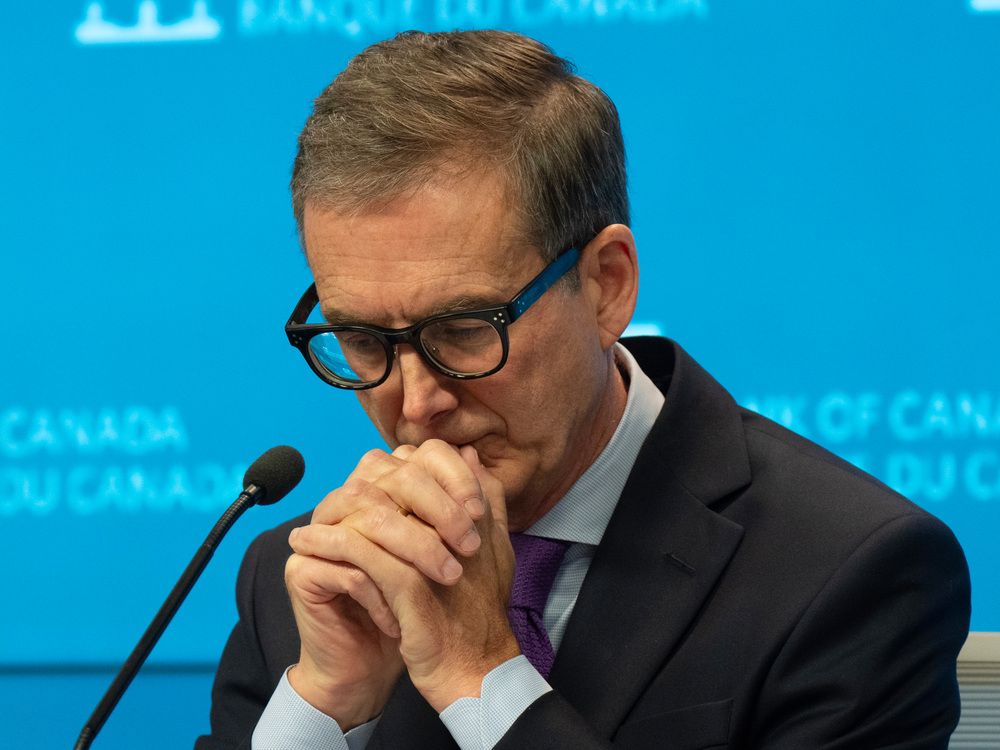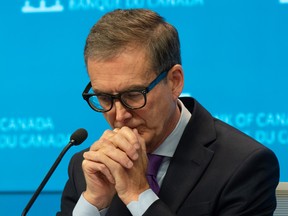Theo Argitis: Return to normal is proving elusive for Bank of Canada

Tiff Macklem’s tenure as governor was supposed to be boring. Instead, it has been anything but

Article content
I feel for Tiff Macklem, Canada’s central bank governor.
The job he took on in June 2020, after a long career as an economist at the Bank of Canada (and shorter stints within government and academia) really wasn’t supposed to be this eventful.
Article content
His predecessor, Stephen Poloz, had already cut interest rates to near zero and launched the unprecedented “money-printing” asset purchases to stabilize the economy in the face of the pandemic.
Advertisement 2
Story continues below
Article content
Macklem wasn’t expected to do much other than fine-tune what Poloz described as “firehose” stimulus, and gradually wind things down as the economy returned back to normal.
Macklem is still searching for that normal, as evidenced by his latest policy decision on Oct. 25, which laid out an unsettled economic landscape that continues to confound policymakers.
According to the bank, Canada will remain in a period of stubbornly high inflation and weak growth for at least another year, which is the complete inverse of what the central bank wants to happen.
Unlike in 2020, when sluggish demand and too-low inflation was the main concern, returning to normal today means slowing the economy and cooling price pressures.
But Macklem still finds himself with the unfortunate distinction as the only governor that has failed to meet the central bank’s mandated inflation target.
Inflation has fallen within the Bank of Canada’s one to three per cent range for only four of the 41 months he’s been on the job. And he acknowledged Wednesday it will take even longer than expected to meet that goal.
Article content
Advertisement 3
Story continues below
Article content
On the surface, Wednesday’s decision was a stay-the-course move that left the central bank’s policy rate at five per cent.
The bank’s immediate objective in its suite of communications, which included a press conference by Macklem and new quarterly economic forecasts, was apparently to tell Canadians not to expect a loosening of monetary policy any time soon even with a slowing economy.
But a bigger takeaway may have been that there’s too much uncertainty to say anything with much conviction at all, so the status quo is as good of a position as any.
The murky inflation outlook is making it difficult to establish coherent communications; the bank’s messaging Wednesday weaved from short-term gloomy to long-term happy.

Let’s start with the gloom.
According to Macklem, there’s still a lot of inflation in the system, along with pressures that could fuel inflation in the future.
These include, but are not limited to, wage gains that are not even in the same stratosphere as productivity gains, demand-stoking government spending, rising oil prices and tight housing markets.
Advertisement 4
Story continues below
Article content
In fact, inflationary risks have increased, with Macklem warning he is prepared to raise interest rates further to cool inflation, if needed.
At the press conference, Macklem said the path to a soft landing is getting narrower — which is essentially an implicit acknowledgement he is ready to trigger a downturn to curb price pressures.
This is the point in the bank’s story where the gloom ends and the messaging pivots to positive.
Even if the path to a soft landing has gotten narrower, the Bank of Canada still expects the landing to be soft.
Growth will be weak but still positive over the next year, according to its latest projections, with a much stronger rebound in 2025.
To be sure, inflation will be faster this year and in 2024 than expected.
But the Bank of Canada doesn’t believe that will impact the trajectory in 2025, when we are told it will be back to target.
This sounds a lot like the central bank thinks the current inflation stickiness is transitory, though no one dared use that word Wednesday since central bankers have wiped it from the collective lexicons.
In sum, the slowdown won’t be that bad, inflation will be back near two per cent soon enough, interest rates will inevitably drop from current levels, we are not entering a period of stagflation. The elusive normal is coming — projected to take place about five years after Macklem took the job.
Advertisement 5
Story continues below
Article content
As I’ve written before, disinflationary episodes like the current one have almost always been accompanied by deep recessions. So this still-positive scenario is outside of the historic norm, but it’s plausible.
I’m sure Macklem believes it, too. But if he didn’t, telling Canadians he’s about to engineer a recession would be a tough river to cross.
Earlier this week, Ontario Premier Doug Ford issued an open letter to Macklem warning him that there is “simply no excuse” for another interest rate hike. Macklem has faced pressure — to various degrees — from others as well to tread carefully, including Finance Minister Chrystia Freeland.
There are questions — even among economists — whether the rate hikes are actually making a difference in slowing inflation, or whether central bankers should just tolerate higher inflation in order to limit damage to the economy.
Related Stories
Macklem’s position right now appears to be that he’s still committed to the central bank’s inflation target but he doesn’t think Ford and other worried Canadians need to fret too much that the aggregate costs of curbing price pressures will be debilitating.
To reconcile those two things, the Bank of Canada appears to be relying on the part of the mandate that allows him to be “flexible” if needed around how quickly inflation needs to return to target. In the process, he’s testing the nation’s flexible inflation targeting mandate to the maximum.
Theo Argitis is managing director at Compass Rose Group.
Article content








Comments
Postmedia is committed to maintaining a lively but civil forum for discussion and encourage all readers to share their views on our articles. Comments may take up to an hour for moderation before appearing on the site. We ask you to keep your comments relevant and respectful. We have enabled email notifications—you will now receive an email if you receive a reply to your comment, there is an update to a comment thread you follow or if a user you follow comments. Visit our Community Guidelines for more information and details on how to adjust your email settings.